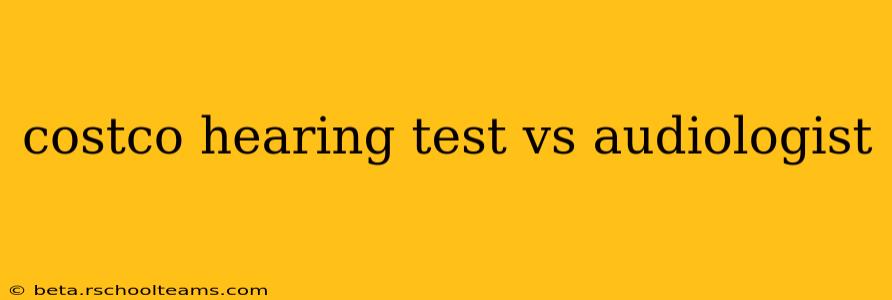Choosing where to get your hearing tested can feel overwhelming. Costco offers convenient and often affordable hearing tests, but are they as thorough as a visit to a licensed audiologist? This article will delve into the key differences between a Costco hearing test and a comprehensive audiological evaluation to help you make an informed decision.
What Does a Costco Hearing Test Entail?
Costco hearing aid centers typically offer basic hearing screenings. These screenings usually involve a quick test using an automated audiometer to check your hearing thresholds at various frequencies. The results are often presented as a simple graph, indicating areas of potential hearing loss. Important Note: These screenings are generally performed by trained hearing aid specialists, not licensed audiologists. This means the scope of their expertise and the types of tests performed are limited compared to a full audiological evaluation.
What Does a Comprehensive Audiological Evaluation Include?
A licensed audiologist conducts a far more extensive hearing test. This involves a range of assessments, including:
- Pure-tone audiometry: This is similar to the test offered at Costco, but with a more detailed and precise assessment.
- Speech audiometry: This tests your ability to understand speech at different volumes and in various listening environments.
- Tympanometry: This measures the movement of your eardrum and middle ear to identify potential middle ear problems.
- Acoustic reflexes: This test evaluates the reflexes of the middle ear muscles to help diagnose certain types of hearing loss.
- Otoacoustic emissions (OAEs): This non-invasive test assesses the function of the inner ear's hair cells.
The audiologist will also thoroughly discuss your medical history, lifestyle, and hearing concerns to create a comprehensive understanding of your hearing health. They can diagnose the type and degree of hearing loss, rule out other potential medical conditions affecting your hearing, and recommend appropriate treatment options.
How Much Does Each Cost?
Costco hearing screenings are often advertised as being more affordable than a visit to an audiologist. However, the price can vary depending on location and any additional services offered. Keep in mind that the low cost of the screening might not reflect the overall cost if you decide to purchase hearing aids from Costco.
A comprehensive audiological evaluation will typically be more expensive upfront. The exact cost will depend on the specific tests performed, the audiologist's fees, and your insurance coverage. However, the detailed diagnosis and personalized treatment plan can be invaluable in the long run.
What are the Limitations of a Costco Hearing Test?
- Limited scope: Costco primarily focuses on hearing aid sales, so the testing is primarily geared towards identifying hearing loss that can be addressed with amplification. More complex hearing issues may not be adequately assessed.
- Lack of diagnosis: Costco hearing aid specialists cannot diagnose medical conditions affecting hearing.
- No personalized treatment plan: Beyond recommending hearing aids, Costco personnel typically don't provide a comprehensive treatment plan addressing underlying medical issues or alternative solutions.
When Should You See an Audiologist Directly?
You should consult an audiologist directly if:
- You experience sudden hearing loss.
- You experience ringing in your ears (tinnitus).
- You have dizziness or balance problems.
- You suspect a medical condition might be affecting your hearing.
- You require a comprehensive hearing assessment for legal, educational, or other specific purposes.
Costco Hearing Test vs. Audiologist: The Bottom Line
A Costco hearing test can be a convenient and cost-effective way to get a preliminary assessment of your hearing, particularly if you're simply looking to see if you might benefit from hearing aids. However, for a thorough diagnosis and personalized treatment plan, a visit to a licensed audiologist is essential. The choice ultimately depends on your individual needs and the extent of the hearing evaluation required. Don't hesitate to discuss your concerns with both options to determine the best approach for your specific situation.
